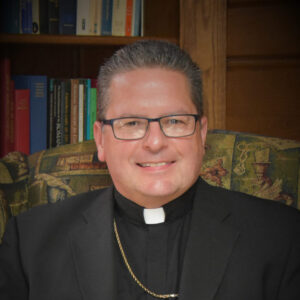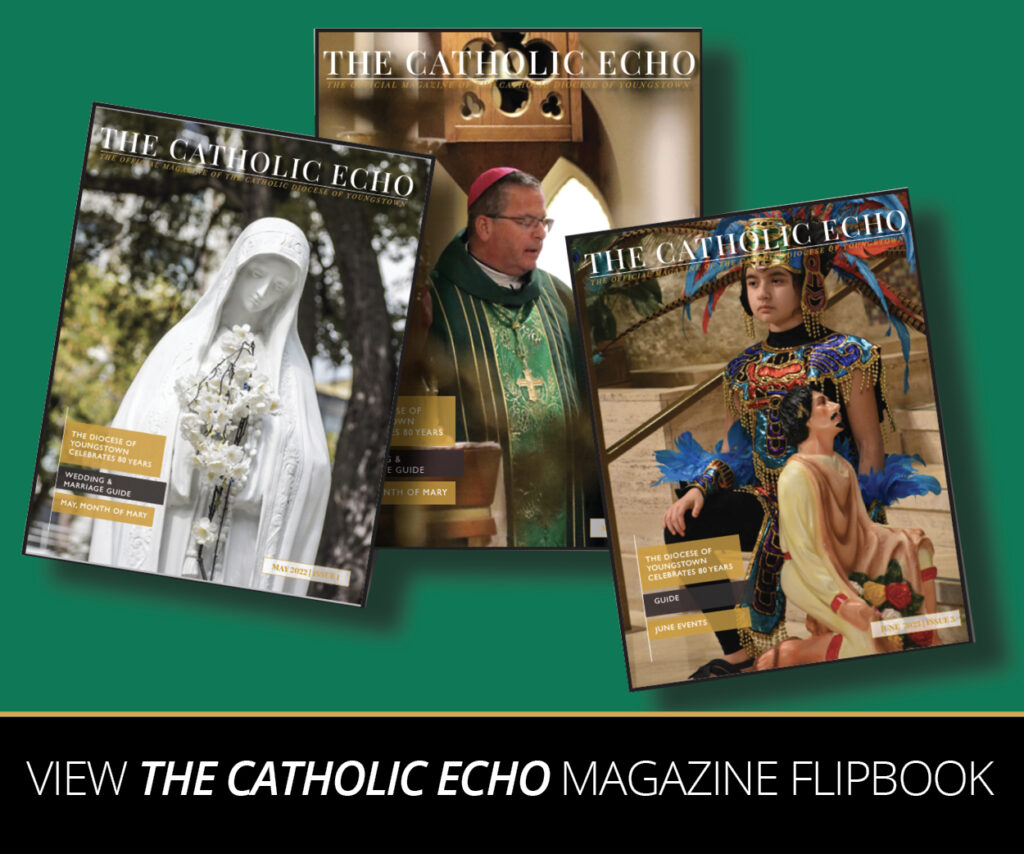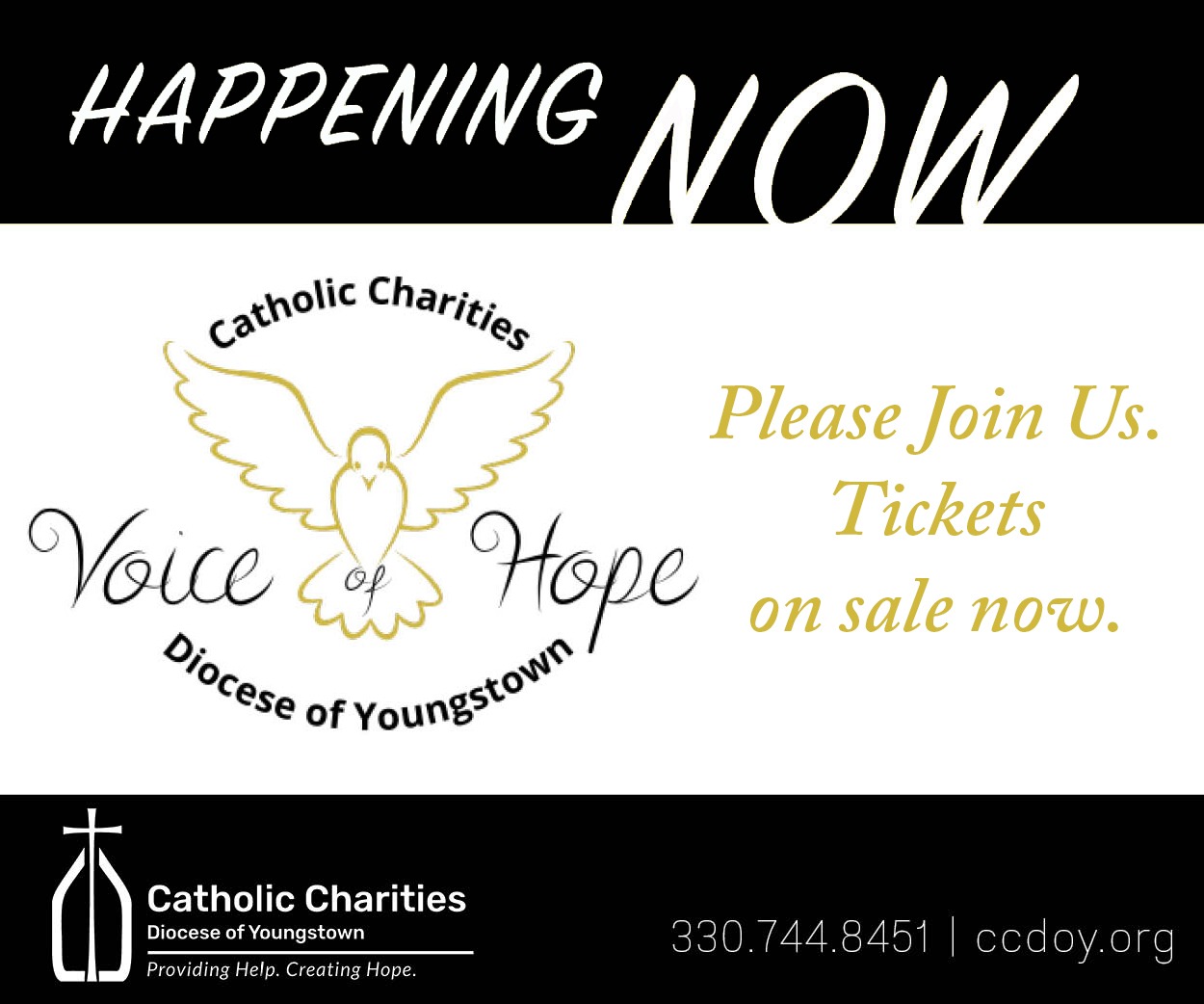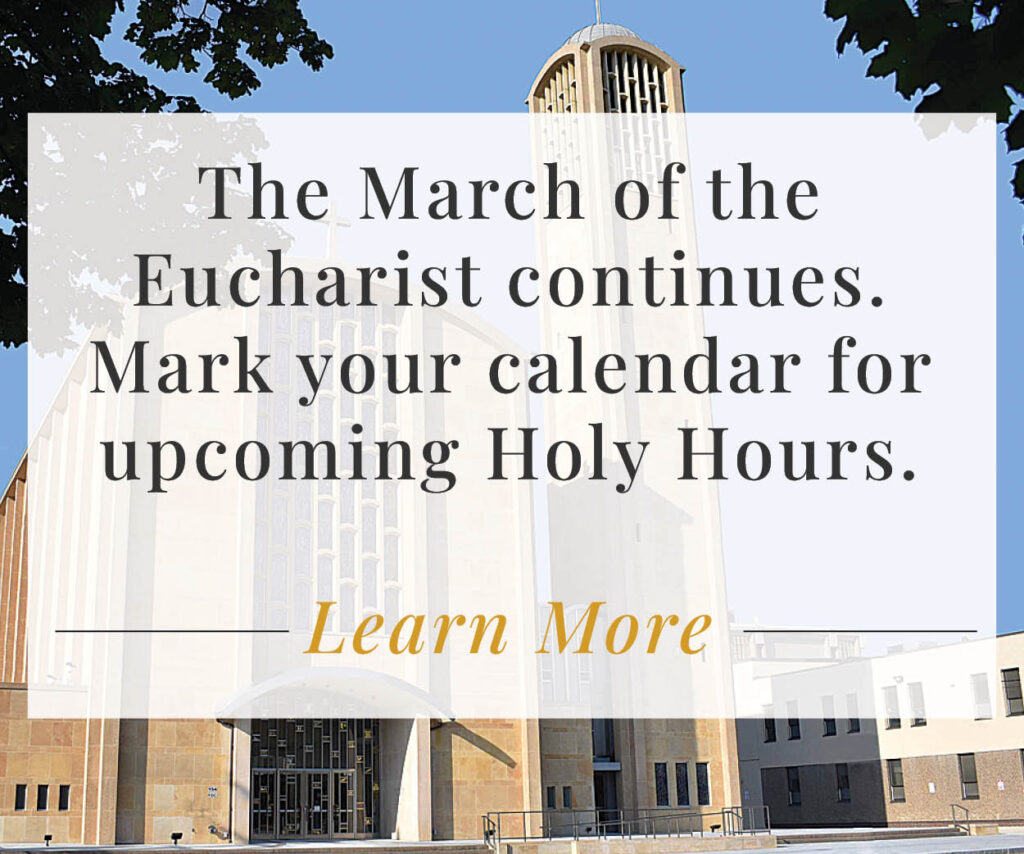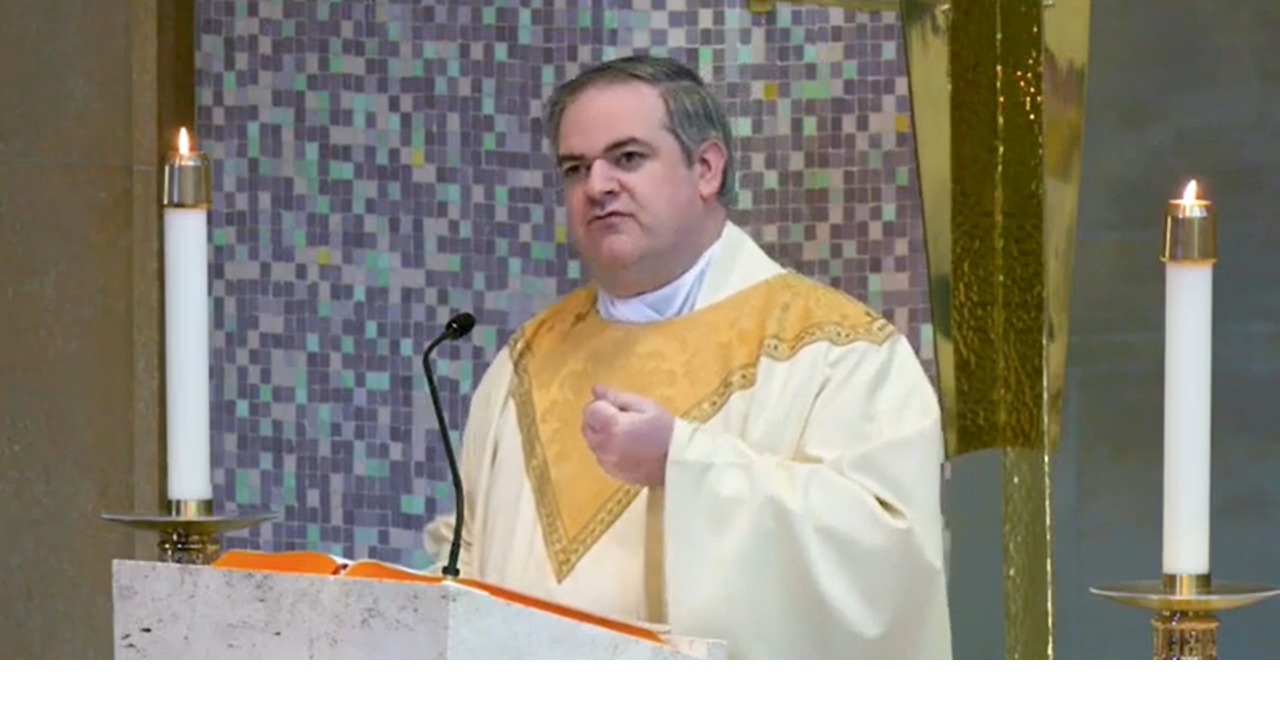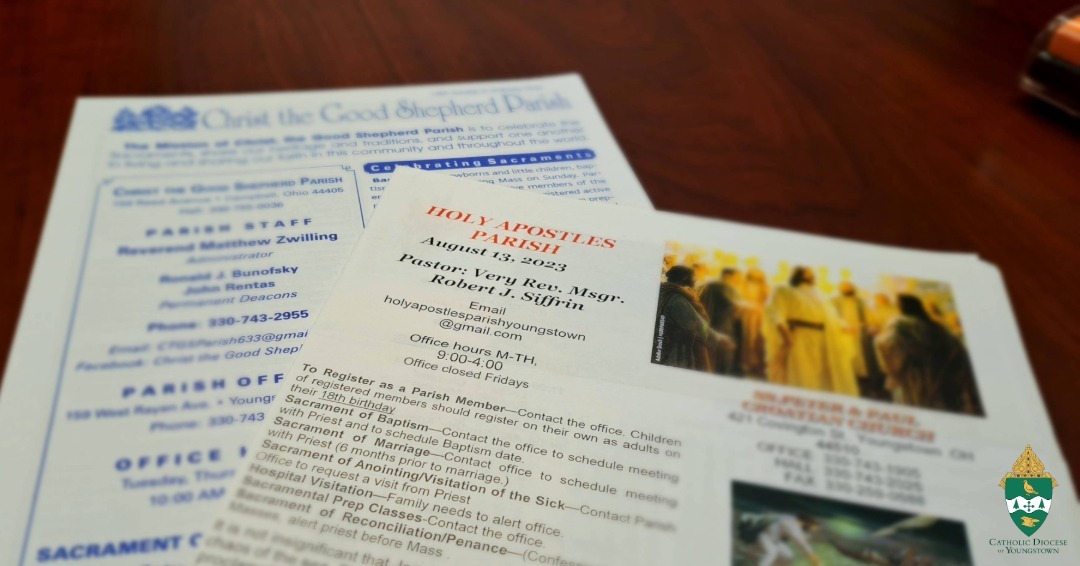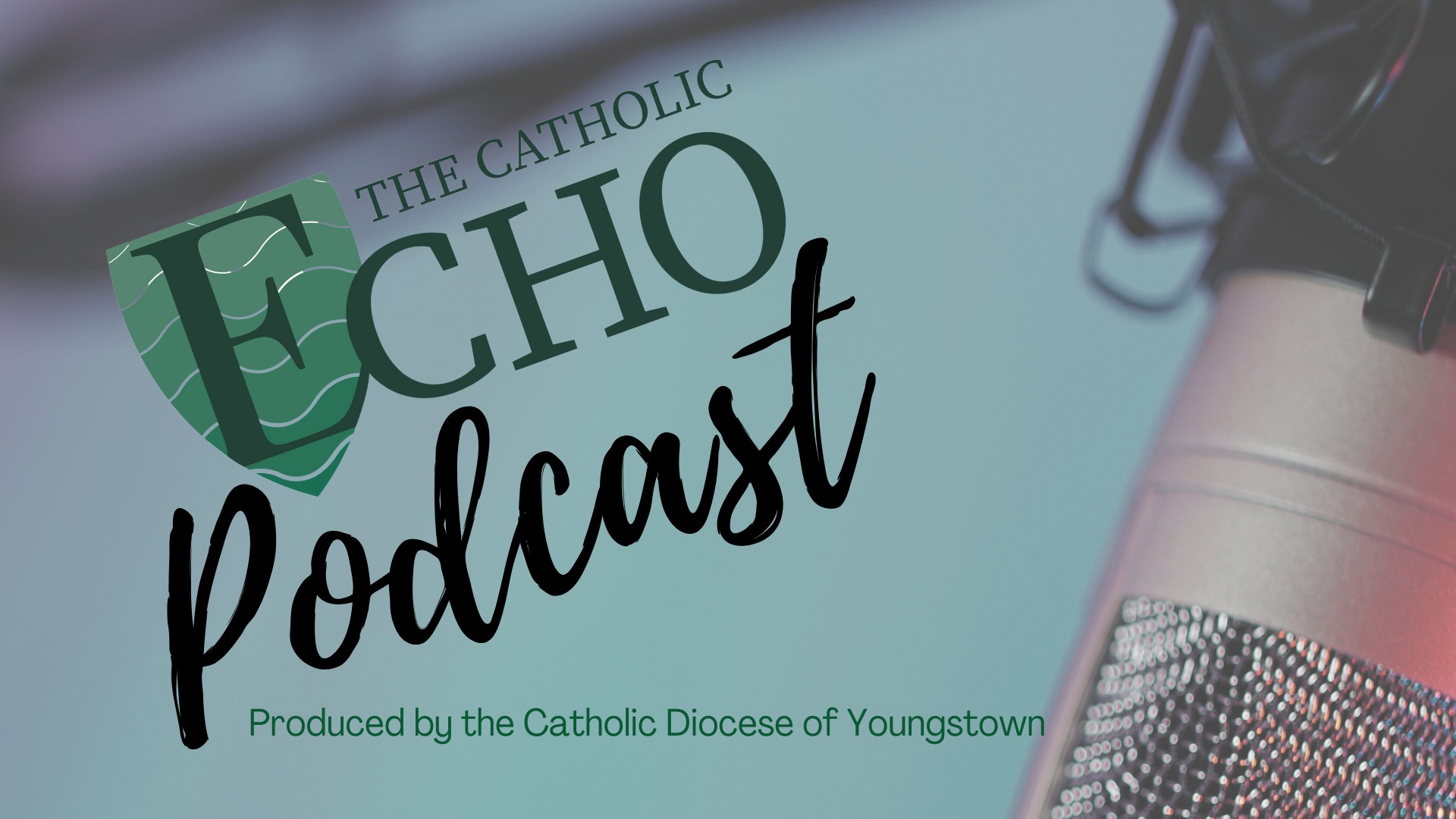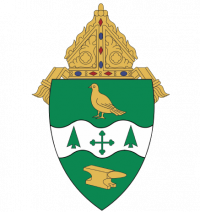Please scroll down for the Spanish translation of Bishop Bonnar’s column.
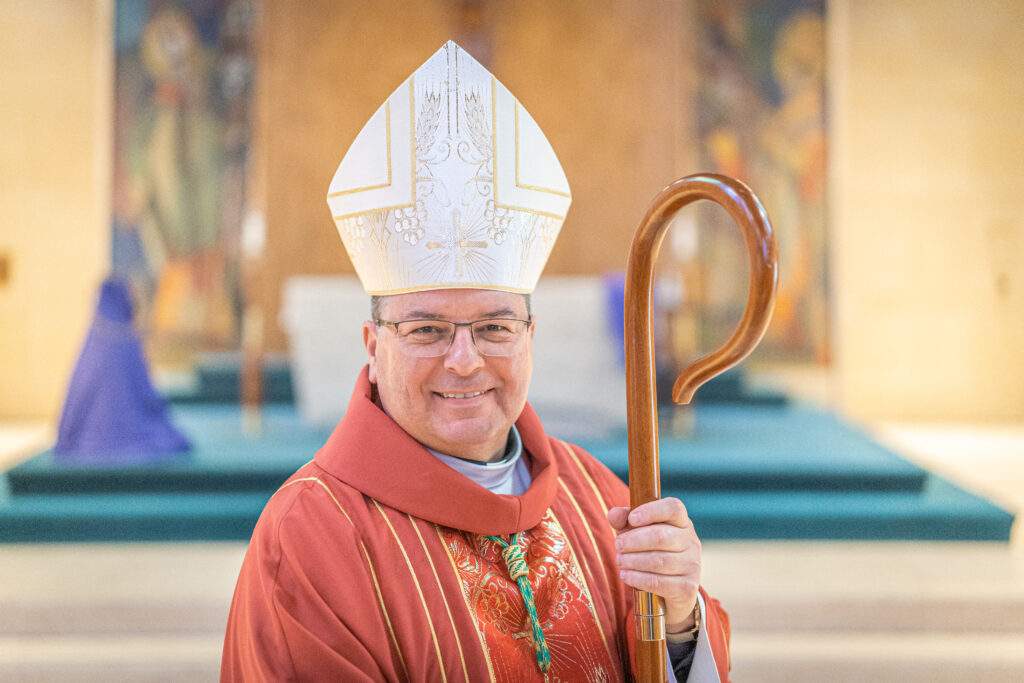
The word “appeal” is defined as “a serious or urgent request, typically to the public.” Every year in our diocese, we conduct the Annual Diocesan Appeal: One in Hope, One in Mission. While this annual Appeal requests monetary donations from our parishioners to support the charitable works of Catholic Charities and diocesan ministries, there is more to this Appeal than just money. You see, we appeal to each donor to include prayer requests with their donations. I, as the bishop, bring these requests into my own prayer.
I have received numerous prayer intentions so far, as the Appeal continues to unfold. I sit with these intentions, praying over them in the quiet of my personal chapel, and I place each of them on the altar. Every time I celebrate Holy Mass in my chapel, these petitions are lifted up to the heavenly Father in what is for us the greatest of prayers.
When I was a parish priest and prepared couples for marriage, I often encouraged them to take a walk and have a conversation about their prayer life because prayer reveals much about what is in a person’s heart. The exercise of praying with these prayer requests from our donors has been so revealing and inspiring. I feel as though I have been given a glimpse into their hearts.
What I discovered in this appeal for prayers are deep and caring hearts filled with worry, concern, longing and gratitude. Within the many requests there are names. Some of these names point to relationships with parents, grandparents, siblings, children and grandchildren, relatives as well as friends—and even enemies. The intentions involve people who are living and deceased, people who are physically near and far. There are even appeals for prayer for people the donors never met. Nevertheless, the concern for people in Ukraine, Turkey and Syria is heartfelt. I was particularly awestruck by the plea of prayers for our brothers and sisters in East Palestine in the aftermath of the train wreck.
Many of the prayer requests seek peace in our world and country. There were some prayers desiring family peace and reconciliation. Obviously, the lack of peace in any situation or place is heartbreaking. Peace, however, often demands that people listen, understand and forgive. There was an array of intentions for these key actions of peace.
Some of our donors requested prayers for those who are suffering as a result of loss, addiction or illness, or those who are bearing a particular cross. I was humbled by the compassion and concern voiced in these intentions. No one can say that people do not care in this portion of the Lord’s vineyard. Our donors’ sincere prayers for those in need demonstrate charity and genuine fraternal concern.
The requests submitted to me contained many for the Church. Some people prayed for their priest and parish by name, as well as beloved religious sisters. There were prayers for more religious vocations. Some people appealed for prayers for me, as the bishop. One person, in particular, prayed that I make better decisions. Some asked for prayers to help us respect the dignity of every human person and to safeguard and protect human life. Many people prayed for a happy and peaceful death.
Perhaps the most prevalent prayer next to the intention for peace was the intercession seeking the return of their loved ones to the Church who have fallen away from the faith. I could feel a piercing ache with their words. Many of the prayers revealed to me a deep sadness because there are some family members who, for whatever reason, choose not to worship with us. This heartache is particularly heavy for parents who formed their children in the faith, as well as for spouses who are not worshiping together.
My takeaway from this experience is that, not only do we need to keep praying, we also must continue to pray for one another. In The Joy of the Gospel, Pope Francis speaks about the missionary power of intercessory prayer, which helps us to seek the good of others. The Holy Father writes, “When evangelizers rise from prayer, their hearts are more open; freed of self-absorption, they are desirous of doing good and sharing their lives with others” (#282).
Pope Francis adds, “Intercession is like ‘a leaven in the heart of the Trinity.’ It is a way of penetrating the Father’s heart and discovering new dimensions, which can shed light on concrete situations and change them” (#283). In other words, never underestimate the power of intercessory prayer. Indeed, prayer is so revealing!
Let us pray: “That all may be one.”
La palabra “apelación” se define como “un pedido serio o urgente típicamente al público”. Cada año en nuestra diócesis, llevamos a cabo la Campaña Anual Diocesana: Uno en la Esperanza, Uno en la Misión. Si bien este llamamiento anual pide donaciones monetarias de nuestros feligreses para apoyar las obras caritativas de Caridades Católicas y los ministerios diocesanos, en esta campaña hay más que solo dinero. Verá, apelamos a cada donante para que incluya peticiones de oración con sus donaciones. Yo, como obispo, traigo estas peticiones a mi propia oración.
Hasta ahora he recibido numerosas peticiones de oración, mientras la campaña continúa desarrollándose. Me siento con estas peticiones a orar por ellas en la quietud de mi capilla personal, y pongo cada una de ellas en el altar. Cada vez que celebro la Santa Misa en mi capilla, estas peticiones son elevadas al Padre celestial en la que es para nosotros la mayor de las oraciones.
Cuando era sacerdote de una parroquia y preparaba a las parejas para el matrimonio, a menudo los animaba a dar un paseo y conversar sobre su vida de oración porque la oración revela mucho sobre lo que hay en el corazón de una persona. El ejercicio de la orar con estas peticiones de oración de nuestros donantes ha sido muy revelador e inspirador. Siento como si me hubieran permitido dar un vistazo a sus corazones.
Lo que he descubierto en este llamado a la oración son corazones profundos y afectuosos llenos de preocupación, anhelo y gratitud. Dentro de las muchas solicitudes hay nombres. Algunos de estos nombres apuntan a relaciones con padres, abuelos, hermanos, hijos y nietos, parientes y amigos, e incluso enemigos. Las intenciones involucran personas vivas y fallecidas, personas que están físicamente cerca y lejos. Incluso hay pedidos de oración por personas que los donantes nunca han conocido. Sin embargo, la preocupación por las personas de Ucrania, Turquía y Siria es sincera. Me quedé particularmente asombrado por la súplica de oración por nuestros hermanos y hermanas en el este de East Palestine después del accidente de tren.
Muchos de los pedidos de oración piden paz en nuestro mundo y el país. Hubo algunas oraciones deseando paz familiar y reconciliación. Obviamente, la falta de paz en cualquier situación o lugar es desgarradora. Sin embargo, la paz, a menudo demanda que las personas escuchen, comprendan y perdonen. Hubo una variedad de intenciones para estas acciones clave de la paz.
Algunos de nuestros donantes pidieron oraciones por aquellos sufriendo como resultado de una pérdida, adicción o enfermedad, o aquellos que llevan una cruz en particular. Me sentí honrado por la compasión y la preocupación expresadas en estas intenciones. Nadie puede decir que a la gente no le importa esta parte de la viña del Señor. Las sinceras oraciones de nuestros donantes por aquellos necesitados demuestra la caridad y una genuina preocupación fraternal.
Los pedidos que se me presentaron contenían muchos por la Iglesia. Algunas personas oraron por sus sacerdotes y parroquias por su nombre, así como por sus amadas hermanas religiosas. Hubo oraciones por más vocaciones religiosas. Algunos pidieron oraciones por mí, como obispo. Una persona en particular oró para que yo tome mejores decisiones. Algunos pidieron oraciones para ayudarnos a respetar la dignidad de cada persona humana y salvaguardar y proteger la vida humana. Muchas personas oraron por una muerte feliz y en paz.
Quizá la oración más frecuente junto a la intención por la paz fue la intercesión buscando el regreso a la Iglesias de los seres queridos que se han apartado de la fe. Podía sentir un dolor punzante en sus palabras. Muchas de las oraciones me revelaron una profunda tristeza porque hay algunos miembros de las familias que, por alguna razón, eligen no adorar con nosotros. Este dolor es particularmente pesado para los padres que formaron a sus hijos en la fe, así como para los cónyuges que no adoran juntos.
Mi conclusión de esta experiencia es que no solo debemos seguir orando, sino que también debemos continuar haciéndolo los unos por los otros. En La Alegría del Evangelio el Papa Francisco habla sobre el poder misionero de la oración de intercesión, que nos ayuda a buscar el bien de los demás. El Santo Padre escribe: “Cuando un evangelizador sale de la oración, el corazón se le ha vuelto más generoso, se ha liberado de la conciencia aislada y está deseoso de hacer el bien y de compartir la vida con los demás” (N° 282).
El Papa Francisco agrega, “La intercesión es como «levadura» en el seno de la Trinidad. Es un adentrarnos en el Padre y descubrir nuevas dimensiones que iluminan las situaciones concretas y las cambian” (N° 283). En otras palabras, nunca subestime el poder de la oración de intercesión. De hecho, ¡la oración es tan reveladora!
A medida que avanzamos, oremos, “Que todos sean uno.”

